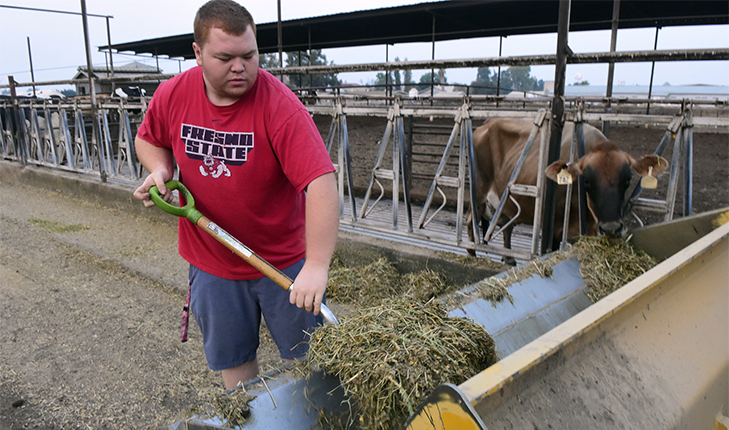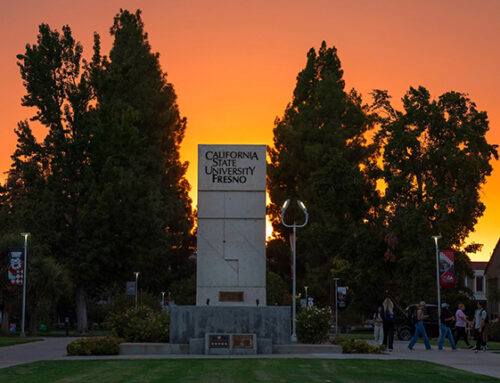Many of recent Fresno State graduate Riley Budd’s fondest memories came as he grew up hiking and camping in the nearby Sierra Nevada forests and mountains while training to become an Eagle Scout.
The Fresno native returned to one of those favorite areas between Florence Lake and Lake Thomas A. Edison last September with two hiking partners and scout masters, James Wade Sponsler and Albert Yurgal.
It was supposed to be a 20-mile, overnight hike that started the Friday afternoon before Labor Day. The outing, barely a 90-mile drive from Fresno, was planned as a tune-up for another longer hike on the adjacent John Muir Trail, a high-country paradise for accomplished hikers.
However, the next morning when they woke up at their alpine campsite, they saw an ominous cloud of smoke over the ridge to the southwest near Shaver Lake.
After texting with their families back in Fresno via a satellite phone, they learned about the early stages of the Creek Fire. The blaze had started slowly the previous late afternoon and had unexpectedly escalated overnight due to sudden winds and extra dry, hot conditions.
The trio quickly packed up their belongings and moved hastily with their 40-pound backpacks down the trail 16 miles to one of their cars parked at Florence Lake.
“In our past trips, we had seen plumes of smoke from forest fires occasionally, but we knew this could be different,” Budd said. “We were a little fortunate in that we were going downhill, although with that size pack on, you have to be careful not to trip or turn an ankle or knee. It could have been much worse if we had been farther in the backcountry and not known what was happening with the fire.”
They had hoped the road back to Fresno, via Kaiser Pass Road and Highway 168, might still be open. However, when they reached one of their cars at Florence Lake, firefighting teams had closed the route just an hour earlier.
The trio decided to drive the other direction, away from the fire, 12 miles north to Lake Edison and the Vermillion Valley Resort, which might have more resources and food.
When the trio first arrived at Vermillion with 15 to 20 other stranded hikers, they found an unconscious individual who wasn’t breathing being attended to by an emergency nurse. For an hour, Budd assisted with administering CPR to the victim, who was never revived.
Their scout training also prepared them for other emergency duties such as creating lists of emergency contacts, potential evacuation plans and ride shares if the road briefly opened.
Budd also became a cook for the growing numbers of stranded visitors, which grew to over 140 civilians, and later included another 10 Fresno police and sheriff personnel. Together they pooled and rationed their food resources with the resort’s supplies into breakfast and dinner meals.
“Even though we were all nervous to some degree, I still felt I was fairly prepared for everything from my scout training,” Budd said. “My partners and I focused our energy on helping others, and trying to make sure we made the situation better however we could.”
Early on the fifth day of the fire, a window of opportunity arrived at 3 a.m. and allowed the successful landing and the first of eight trips by Blackhawk and Chinook rescue helicopters.
Budd and his partners assisted in loading each subsequent flight until it was their turn on the final trip for the 45-minute flight back to the Fresno airport. Upon his return, he was relieved to find that no others from the Edison site had been seriously injured, and only a few had gone to the hospital for smoke inhalation reasons.
“I had a sore throat for a few days after, but otherwise, the main effects on me were the physical and mental toll of the experience, including the CPR situation,” Budd said. “We were also lucky to have a number of trained people up there to provide assistance and guidance that included a nurse, a search and rescue team member and other enforcement officers.”
The fire, which ultimately burned nearly 380,000 acres over the course of almost four months, became the then-fourth-largest in state history.
“The flames were about four miles away when we were airlifted and you couldn’t see anything below except for mostly smoke and a red glow,” Budd said. “The smoke had been bad at the lake each day, but everybody already had masks because of COVID. We used those to protect ourselves from the smoke as best we could.”
After returning to their vehicles months later, he hiked in the area again this July and did a similar route to assess the fire’s aftermath.
“It was interesting to see the contrast to what was there before, but it hasn’t changed my love of the outdoors,” Budd said, “Hiking isn’t always going to be completely safe, so being prepared is key. We have dealt with lightning in the exposed high country; wild animals like bears and rattlesnakes; and injuries. In those situations, it often comes down to your adaptability, considering your other options, and staying as calm as possible.”
Budd, who graduated in the spring of 2021 with a degree in criminology and an emphasis in law enforcement, is ready to extend that connection as a state park officer, which would also include park ranger duties. He is halfway through the application process, and if accepted, would be invited to a six-month, full-time academy next year.
“I was drawn to criminology because I wanted to help the community and protect those around me,” Budd said. “Being able to work outdoors and protect our wildlife and natural resources would make for an extra special career.”
In the meantime, he is working part-time at the local Fresno Scout Shop, which sells uniform and camping items for area scouts and troops.
He is also busy taking two classes. One is an emergency medical training class at Fresno City College. The other is a chemistry prerequisite course at Reedley College to prepare for the Fresno State animal science master’s program, where he could also conduct dairy-related research.
Even though he has no family background in agriculture, he was drawn as a Fresno State freshman to the dairy industry by an introductory animal science course taught by graduate student Mikaela Fringer. Budd was later invited to help raise Holstein calves for her graduate milk research project. That experience led him to pursue a student assistant position at the campus dairy and an animal science minor.
“I had always wanted to learn more about agriculture and animals, and it ended up being a great fit,” Budd said. “By working at the dairy, I found other students who were equally committed and passionate about providing food for others and caring for livestock. Once you become part of a team like that, you don’t want to let the others down.”
In August, he finished his third year working at the dairy, which was a full-time job during summer and winter breaks and 20 hours a week during the semesters. He prepared and fed the 400-cow herd in the early morning hours, then scraped corrals, moved manure, checked pumps and ponds, and handled other facility and maintenance tasks.
Students are well-prepared for the demands for one of agriculture’s most demanding industries and requires hands-on work and a 24-hour, seven-day-a-week cycle.
“You either love it or you don’t, because it challenges you both physically and intellectually,” Budd said. “No matter how careful or prepared you are, you always have to keep an eye out for the unexpected with the animals, facilities and equipment. I guess it’s also why I was attracted to the criminology degree and being an Eagle Scout, too. You’re always adding new skills while helping others, and the more you invest, the greater the return.”





